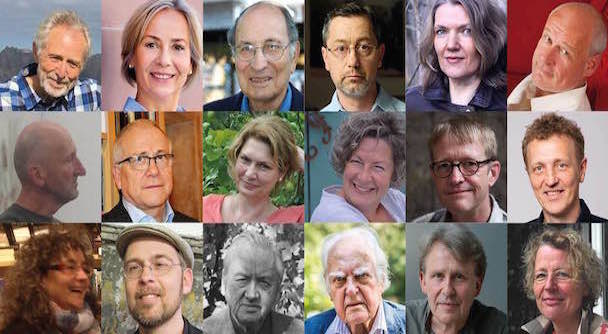Authors & Books
Norbert Abels

Born in 1953 in Schmallenberg, Abels studied philosophy, literature, music, and Jewish studies.
A short overview about some of his professional life: He worked as publicist, university lecturer (1981-1993 for theatre, Johann Wolfgang Goethe University Frankfurt, since 1978 for the history of literature and theatre, mediacampus, Frankurt / Main), musician (since 1978) and dramatic advisor (since 1987 Opera Frankfurt, 1996-1997 theatre Wiesbaden).
He has also been involved in different projects, for example the Bayreuth festival (2004-2010).
He is currently working as university lecturer for dramaturgy of the musical theatre at Folkwang-Hochschule in Essen.

978-3-86638-422-4

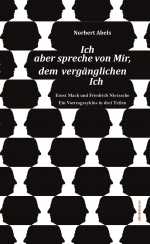
978-3-86638-431-6

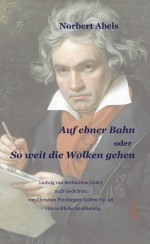
978-3-86638-430-9

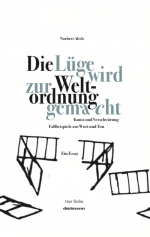
978-3-86638-321-0

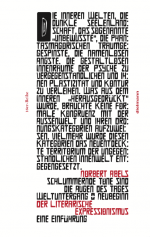
Schlummernde Töne sind die Augen des Tages (Slumbering Tones are The Eyes of The Day)
Literary Expressionism – an Introduction
- Series »16pages«
- 40 pages
- hand bound
- with illustrations
978-3-86638-336-4

In course of his diverse and extensive lecture activities, Expressionism has repeatedly been a core moment in the cultural history of modernism for Norbert Abels. In this respect, he has compiled here a concise introduction to literary expressionism that, despite ist brevity, is mighty powerful.
The expressionism (lat. expression – expression), according to its word meaning, aimed to exemplify the inner worlds, the dark landscape of the soul, to the so-called "unconscious", the nameless fears and the shapeless inner spaces of the psyche and to give them plasticity and contour.
That is how the small but very dense volume begins and it takes a close look at the most important topoi and „leaders“ of literary expressionism, including for example, Franz Werfel: An den Leser – Franz Kafka: Gib’s auf – Gottfried Benn: Mann und Frau – Hugo Ball: gadji beri bimba
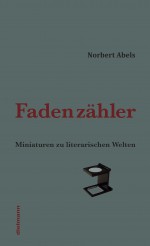
Fadenzähler (Linen Tester)
Miniature to Literary World
- a beautifully made softcover
- 400 pages
978-3-86638-295-4

The linen tester, as Norbert Abels explains to us in his preliminary remarks, often mounted on a brass stand, is a special, highly intensifying form of magnifying glass. All kinds of objects can be made more clearly visible with this wonderful instrument. […] The linen tester serves me as metaphor for illustration, for the illumination of invisible or overlooked details, for the more delicate observation of opaque, encoded peculiarities, as well as for the avoidance of perceptual barriers, the maximization of focal length and angle of view, or the discovery of aberrations.
From such an effort for clarification resulted my modest attempts to look at the texts again—but differently—in their now more changed reductions.
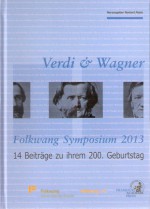
Verdi & Wagner
Folkwang Symposium 2013
- hardcover with bookmark
- 14 lectures
- 304 pages
978-3-86983-013-1

In 1813, the year of the Battle of the Nations, Verdi and Wagner were born. They never met personally.
Occasionally, they were brought together but without recognizing each other. Wagner, the son of a police writer coming from a humble background, and Verdi, son of a north-italian restaurant owner: They revolutionized the art form of musical theater fundamentally, in completely different ways with programmatical distance to each other.
14 well-known cultural scientists and musicologists talk about these giants of musical history. All lectures pay attention to BOTH composers at the same time. They enlighten musical, historical, literary historical, sociological and media studies aspects and thus offer brandnew insights in the work of two outstanding artist.
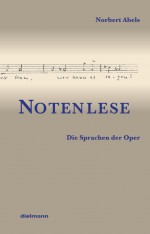
Harvest of Tones
Language Music
- 600 pages
- 66 Essays
- hardcover
978-3-86638-332-6

Norbert Abels gives us 66 essays on the relations between music and language, and vice versa: by showing cooperation between righters and musicians, between composers and poets.
A book full of explorations in our Thinking and Feelings!
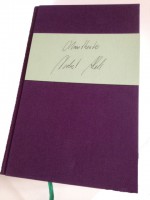
Ohrentheater
in purple linnen
- original title paper
- signed by the author
978-3-86638-008-Vorzug

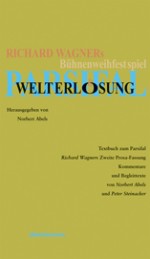
Welterlösung
Richard Wagner's Parsifal
- 120 pages
- Series Label (Reihe ETIKETT)
978-3-86638-159-9

Wagner’s Opera »Parsifal« for the first time in a church – the textbook (libretto), additionally a prose version and one essay each by Norbert Abels and Peter Steinacker, supplemented by historical annotations for the developement and its background.
The tremendousness, after Johann Jeseph Görres emerging »Gralskonjunktur« was also noticed by Richard Wagner. Because of this first ideas for a work based on the matter increasingly appeared since the middle of the 1860s. Meyerbeer’s incorporation of the lutheran choral »Eine feste Burg« as well as the in 1836 for the first time sounding Paulus-Oratorium, which is garnished with protestant choral traditions, by Mendelssohn Barholdy, who mWagner got to know in the same year. Those two might have given him musical impulses for the later churchmusical interpolation of Parsifal. Only about a decade after the in many aspects important year of initiantions 1836, grew, during a stay at a healt resort in Marienbad, the plan for a work about an interpretations of the matter of »The Holy Grail«. Wagner mystified the moment of his inspiration as as usual in this autobiography as a divine conception, and took liberties with time and place. For him imaginations had the same claim of reality as empirical facts. It is important, that the more and more accumulating material for association put him under a magical spell as proved for the next 40 years to be a – using the words of Novalis – it did not deal less with the long hike of atoneartistic anchorite thorugh the desert of the mind than with the way of integration between art and religion to form the sounding »Hügelpredigt« (hill sermon) in Bayreuth. – This horizon is illuminated by the book »Welterlösung«.
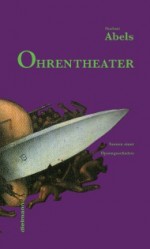
Ohrentheater
Scenes of a history of opera
- 81 essays
- 848 pages
- Series Main Works (Reihe Die Hauptwerke)
- There is a small advantage edition...
978-3-86638-212-1

About Ohrentheater
The opera as musical form, as stageexperience and medium accuires new fascination. Abels, leader of dramaturgy at the opera Frankfurt, promotes this enthusiasm is along special developements of the opera in the last 400 years.
Why choose componists to employ hunchbacks and disabled persons in thier œuvres? In which ways does the great gesture of an operretta differ from the kitch of a musical- or is it vice versa? What has the opera discovered from love and marriagedrama? Has it invented new mental states? Which fanctions have letters and messangers on stage, and what kind of messanger does the spactator need to be able to receive the massage of the opera? –
Norbert Abels alludes to over 70 different operas and draws form them the scenes of his history of the opera.
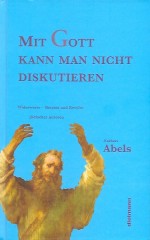
Mit Gott kann man nicht diskutieren
Oppositions - skepsis and revolt of jewish authors
- 160 pages
- Series Main Works (Reihe Die Hauptwerke)
- 10 essays
- with bookmark
978-3-86638-009-7

Norbert Abels is dealing with a selection of jewish writers, who have one thing in common: they are said to be stubborn, debating admonishers and clear sighted writers of history and stories. They give oppositions assiduously.
Scholem Alejchem, Lion Feutchwanger, Arthur Schnitzler, Stafan Zweig, Franz Werfel, Edgar Hilsenrath, Alice Rühle-Gerstel, Bruno Schulz, Willy Haas, Manès Sperber are the voices, who are asked to speak and are being newly read.
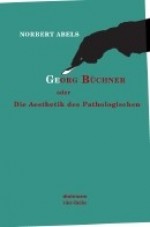
Georg Büchner: Die Ästhetik des Pathologischen
3 Essays to Celebrate his 200. Birthday
- 48 pages
- Series »16pages«
- hand bound
978-3-86638-173-5

The »brutish rationality« (Woyzeck) has it’s own semantics which does not plumb in the end.
It is no cooincidence that its counterpart »reason« is often associated with terms of violence. Büchner spoke of the »fortress of reason« (Danton’s Death). The madness is functionalised to portray matirial misery. His intention to shield himself from the scandal of his strangeness through fighting with his rationality. He is not able to stay different, the munition of the »canon of truth« (Danton’s Death) is hunting him, just like it has Büchner .
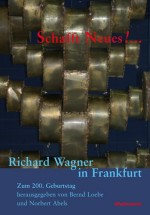
...schafft Neues!
Richard Wagner in Frankfurt
- 554 pages
- Hardcover with bookmark
978-3-86638-025-7

A collection to celebrate Wagner’s 200. Birthday in 2013
You maye also be interested in the NTA: Neue Text-Ausgabe (new text edition) Richard Wagner in 12 volumes.
Edited by N. Abels and Bernd Loebe, Opera Frankfurt.
The book on hand follows alsong the tracks of Richard Wagner at the birthplace of the german Democracy. Through 99 articles with different points of view on Richard Wagner and his works, the connections between Wagner and Frankfurt am Main will be illuminated.
In Frankfurt, where Wagner conducted his »Lohengrin« for the first time and nearly with out abbreviations in the Stadttheater in september 1862 and despite many mistakes of the orchestra – especially the wind section – was acclaimed. At the same time he kept a close relationship to the actress Friederike Meyer, the lover of the theatre manager Franz Georg Cal von Guaita, who had invited him to conduct – one of the numerous love triangles in his live. Furthermore in the late summer of the same year an according to his live’s history not unimportant incident takes place: Wagner, as frequently in a frolic eccentric mood, offers the three months pregnant Cosmia to drive her himself in his handcart to the hotel »Zum Schwan«. Astonished by her approval he histates. The whole procedure is watched by her husband Hans von Bülow and has consequences ...
To honour Wagner pompous and expensive concerts are organised in Frakfurt, which are acknowledged by the componist not without mockery: »Yes, yes, I understand, you have to produce animal heat trhough the music.« – Wagners own disctinctiveness also catch the Frankfurter’s eyes, which are proven by many articles of contemporaries and following generations. Additionally to authentic sources of muicipal archives and libraries, scattered articles in Frankfurter magazines and some exerpts from books, the in more than a half century published publicatins of the Frankfurt opera, from their inventory , of which the main part of this volume is made up. Those traces point far beyond the town at the Main and are without doubt for all the reader of interest, for whom the »case Wagner« is not closed yet.






